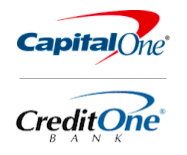Credit One vs. Capital One: What’s the Difference?
They're separate banks with their own financial products, including credit cards. Overall, Capital One’s cards tend to boast better value and fewer fees than those from Credit One.

Many or all of the products on this page are from partners who compensate us when you click to or take an action on their website, but this does not influence our evaluations or ratings. Our opinions are our own.
It’s almost too easy to mistake Credit One for Capital One, and vice versa. Their names sound similar, and their logos could be fraternal twins. Both Credit One and Capital One are banks that issue credit cards and other financial products.



But Credit One and Capital One are not related or part of the same company, and overall there is a significant gap in the quality of each bank’s credit cards. Capital One’s cards generally have better perks and fewer fees than the cards from Credit One — although as such, Credit One cards can often be easier to get.
So before you submit an application for a Capital One credit card (or, wait, is it Credit One?) double-check the name of the bank that's issuing that card. Those few extra seconds could ensure that the card you wanted is the one that ends up in your wallet.
Here are some of the key differences between Credit One and Capital One.
» MORE: Best Capital One credit cards
What is Credit One?
Credit One is a bank that issues credit cards and offers jumbo certificates of deposit. It’s a relatively small bank in terms of assets: On the Federal Reserve’s 2022 list of large commercial banks in America, Credit One ranks 695th. Credit One’s smaller size relative to the top-tier American banks is reflected in its credit card portfolio. As of this writing, Credit One issues just 11 credit cards for a range of credit scores.
What is Capital One?
Capital One is the ninth-largest bank in America, according to the Federal Reserve, and its stature is reflected in the breadth of its financial products and the celebrity spokespeople that Capital One pays to advertise them. You can find loans and checking and savings accounts at Capital One, and almost three times the number of credit cards as Credit One. Capital One’s credit card portfolio caters to a diverse set of consumers. It includes secured cards for those rebuilding their credit, swanky travel cards with annual fees, store cards and business cards.
Credit One credit cards vs. Capital One credit cards
Capital One has more credit cards to offer, and in terms of benefits and fees, they tend to be superior products to Credit One’s cards. Generally speaking, Capital One credit cards provide more value, even — or especially — in cases where the annual fee is more expensive.
At a glance
Credit One | Capital One | |
|---|---|---|
Annual fee range | $0-$99. | $0-$395. |
Foreign transaction fee | Yes. | No. |
Returned payment fee | Yes. | Yes. |
Authorized user card fee | Yes. | No. |
Travel cards | Yes. | Yes. |
Student cards | No. | Yes. |
Secured cards | Yes. | Yes. |
Cash-back cards | Yes. | Yes. |
Business cards | No. | Yes. |
Co-branded cards | Yes. | Yes. |
Rewards
Both Credit One and Capital One have rewards credit cards. The rewards structures on Capital One cards may generate more value — though they may also come with higher credit score requirements. A comparison between Credit One’s Platinum Rewards Visa and the Capital One Savor Cash Rewards Credit Card illustrates this point:
The Credit One Platinum Rewards Visa with no annual fee earns unlimited 2% cash back on eligible purchases of gas, grocery, and internet/cable/satellite TV/mobile phone services. You'll need at least average credit (credit scores of at least 630) to get it.
The Capital One Savor Cash Rewards Credit Card — also with an annual fee of $0 — boasts a higher 3% rate on some comparable categories including dining, entertainment, popular streaming services and at grocery stores, plus 1% on all other purchases. You'll need good credit (credit scores of at least 690) to get it.
The Credit One Bank American Express Card also underperforms a similar card from Capital One. Credit One’s card earns an unlimited 1% cash back on all purchases, while the rate on the Capital One QuicksilverOne Cash Rewards Credit Card is 1.5%. Both are available to those with average credit, and the cards have the same $39 annual fee.
All of Capital One’s rewards credit cards earn unlimited cash back or miles that do not expire.
Fees
Annual fees are another key difference between Credit One and Capital One credit cards. Capital One cards with annual fees tend to offer more value than their Credit One counterparts.
For example, both banks feature rewards cards with a $95 annual fee: Capital One has the Capital One Venture Rewards Credit Card, whereas Credit One offers the Platinum X5 Visa:
Credit One’s card earns up to 5% back on gas, groceries and eligible digital utilities like internet, cable, satellite TV and mobile phone services, and 1% back on all other purchases. You'll need at least average credit to qualify for the card.
The Capital One Venture Rewards Credit Card earns a flat 2 miles per dollar on purchases. You'll need at least good credit to get it.
At first glance, a card offering a top rate of 5% back might seem to beat a card that tops out at 2x back — except that unlike the Credit One card, the Capital One card doesn't impose a cap on bonus rewards. You can earn an unlimited amount, whereas with the Credit One card, the 5% rate is capped at $5,000 in spending each year. After that, all other spending earns just 1% back. That means the most you can earn at the 5% rate is $250. Plus, the Capital One card here offers a number of additional benefits — including a rich sign-up bonus, travel transfer partners and statement credits — that the Credit One card simply can't match, even though these are otherwise common perks for cards in the $95-a-year price range.
Credit One cards also assess returned payment fees and foreign transaction fees, as well as authorized user card fees that must be paid annually.
None of Capital One’s credit cards charge foreign transaction fees or authorized user card fees.
Sign-up bonuses
You’re far more likely to find a sign-up bonus on a Capital One card, even on its cards for average credit.
Credit One’s travel card, the Wander card, once stood out as the sole product in its portfolio to feature a welcome offer, but it no longer offers one.
Meanwhile, a $200 sign-up bonus on a $0-annual-fee Capital One card is commonplace.
Plus, the spending threshold to earn the sign-up bonus on a Capital One card can be fairly low, making the bonus fairly easy to attain. For several Capital One cards, you’ll get the bonus by spending $500 within the first three months of account opening.
Should you get a Credit One or Capital One credit card?
Credit One cards are hardly the worst credit cards on the market. But if you find yourself deciding between a Credit One or Capital One card, pick the latter. Assuming you have the credit scores to qualify, a Capital One card is more likely to deliver bigger rewards and less likely to pile on extra fees.
Capital One Venture Rewards Credit Card
Travel
For a limited time, the Capital One Venture Rewards Credit Card is offering new cardholders an especially rich bonus: Enjoy $250 to use on Capital One Travel in your first cardholder year, plus earn 75,000 bonus miles once you spend $4,000 on purchases within the first 3 months from account opening - that’s equal to $1,000 in travel!
Find the right credit card for you.
Whether you want to pay less interest or earn more rewards, the right card's out there. Just answer a few questions and we'll narrow the search for you.






